although in some cases an aura of good II
The specific ceremony spells can vary from religion to religion, but usually encompass these:
|
|
|
|
|
|
|
|
|
|
|
|
|
|
|
|
|
|
* One creature, one item, or one AREA (see below)
Effect: Ceremony
has a number of applications in the religious organization,
depending on the level of
the cleric.
The effect of a ceremony
spell does not leave behind an aura of magic, <>
although in some cases an
aura of good II ![]() might be present (and thus detectable). <>
might be present (and thus detectable). <>
The specific ceremony
spells can vary from religion to religion, but usually encompass these:
1st-level
cleric: coming of age, burial,
marriage
2nd-level
cleric: dedication,
investiture,
consecrate
item
5th-level
cleric: ordination,
special
vows
7th-level
cleric: consecrate ground
9th-level
cleric: anathematize
<ceremony:
eternal
rest (mentioned in REF5) should be added to the list>
Coming
of age is a limited form of bless which
is CAST upon a young man (and in some cultures a young woman) at some point
relatively early in life,
often the age of 12.
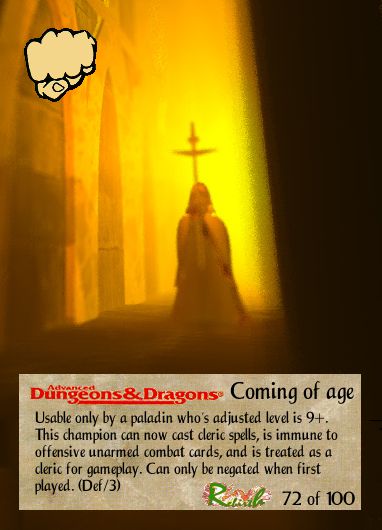
A young person who receives
the spell gets a +1 bonus to any single saving throw, which can be taken
at any time after the coming of age ceremony is completed.
In some cultures, the coming
of age ceremony has a symbolic significance, such that an adolescent
must receive this blessing before he or she can enjoy the rights and privelages
of adulthood.
Burial
magically protects a ,
and bestows it with the
blessing of the religious organization.

The body is shielded for
one week as if by a protection
from evil spell,
and anyone trying to disinter
the corpse within that time must make a save
vs. Spell or stop and flee in fear for
one turn.
Marriage has no tangible after-effect (i.e., it does not guarantee happiness || harmony),
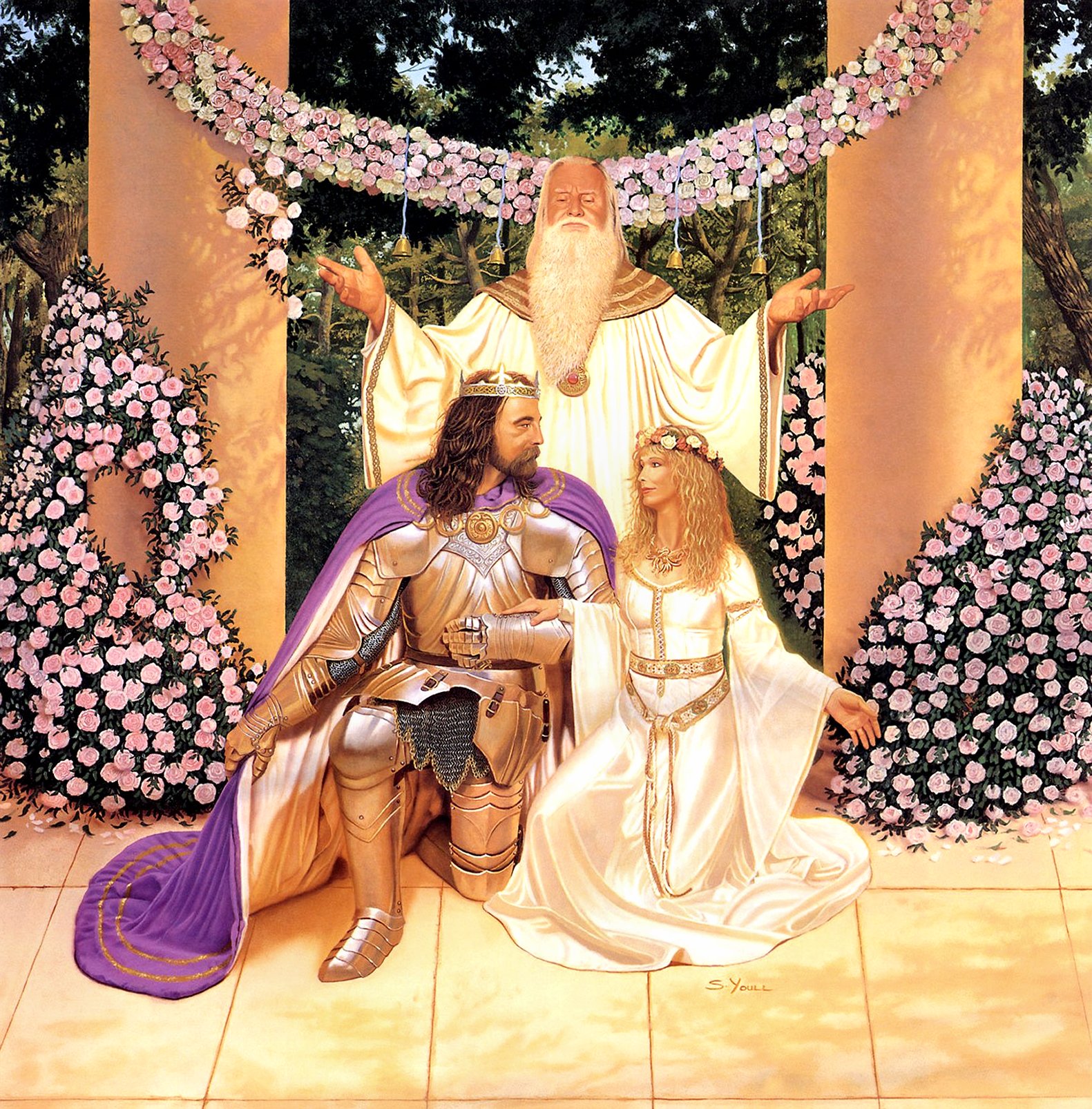
but it usually carries moral
|| legal significance,
not dissimilar in nature
to the various rites of marriage which are performed in our real
world.
Hera (goddess of marriage)

Question: I have a
female character who has gotten herself
pregnant. How should I handle
this?
Answer: I donít really
want to answer this question now, but since
your letter is not the only
one presenting me with this problem, I will say
this much. Stop fighting,
practicing magic and doing other things that
cause stress. The chances
of losing the child are great, and you donít
need to add more to it.
During this time period, medicine was still
progressing and it still
wasnít too great. Most of it was old
wivesí tales.
After you have given birth,
it will be months before you can even
begin to get back into shape
and practice your skills. Female characters
who find themselves with
child soon find themselves retired. This is an
occupational hazard that
should be avoided. Donít fool around and
you wonít have to temporarily
retire your female character and lose the
chance of gaining at all
that experience you could be getting
because
you are with child or just
had one. It is not fair, but that is life.
The reason I donít want to
say more is because I am working on an
article for The
Dragon about women in D&D
and some of the problems
they face. I also intend
to cover pregnancy in the different races and
how to handle it.
Question: How can you handle pregnancy in AD&D games?
Answer: This is one
of those aspects of AD&D gaming that
is left up to
the DM's decisions; all
campaigns are different, and the elves (for
example) within one campaign
could legitimately have longer
gestation periods than those
in another campaign. As a general
rule of thumb, it can probably
be asserted that elves have the
longest pregnancy times
(possibly as much as 2 years); dwarves,
gnomes, humans, halflings,
and half-elves are all about the
same, between 8 and 12 months,
and orcs and humanoids would
have shorter gestation periods,
possible ranging down to 6
months. These are only suggestions,
however; what the DM
decides for his campaign
is the final answer.
(76.64)
Q: One of my players
wants to have a
baby; what should I do?
A: Your question had
me momentarily
confused. If one of your
players wanted to
have a baby, you, the DM,
should be the
last person she should talk
to.
I take
it that you mean that one of your
players would like his or
her player character
to have a baby -- an event
that certainly
requires the DM's involvement.
I
suggest that you handle
it discreetly "offstage."
There is no reason to play
out
having a baby; just assign
a percentage
chance each game month that
the mother
gets pregnant. The chance
should never
be higher than 36%; you
can increase the
chance slightly if one of
the parents is an
orc
or half-orc, and you should decrease it
if one of the parents is
an elf of any type.
Once
the mother is pregnant, you must
determine how long before
the child is
born. The gestation period
for humans is
nine months. This is the
proper period for
most man-sized creatures.
Gnomes and
halflings might require
shorter lengths of
time. In nature, the length
of gestation
depends on the birth weight
of the baby,
not on the lifespan of the
species. The
mother will have to refrain
from adventuring
during the last half of
the pregnancy,
and adventuring after the
birth will
be difficult at best.
You may
decide to introduce a few random
factors such as a survival
percentage
for mother or child, or
the possibility of a
miscarriage. You?re on your
own there ?
just keep the chances small,
if you use
them at all.
(126.12)
PALADINS
Question: I am a
12th-level
Paladin and I want to start
a lineage.
Is this possible?
Can my Paladin get married,
and if so, can he have children?
Answer: Well, most
believe that Paladins practice celibacy.
I firmly uphold this belief
and will not allow my Paladin, Guinivere, to marry.
This is a personal decision,
or it can be made by your DM for you.
Even if they donít marry,
I am quite sure that Paladins are capable of having children.
Question: My male
paladin wants to marry a
CE lady M-U. Is this
okay or does he have to
marry
another (female) paladin?
Answer: This question
is actually very complex.
To answer it fully, we would
have to
define marriage itself.
This would require
a philosophical treatise
of considerable
length. To keep things short,
let?s make a
few assumptions:
1. The
marriage conforms to the Western
definition of the term.
2. The
paladin in question belongs to a
sect or church that allows
its paladins to
get married in the first
place.
3. The
paladin in question has not taken
some kind of vow that might
prevent him
from holding up his half
of the marriage.
Whether or not these assumptions
are
correct depends upon the
circumstances
in your campaign. If they
do apply, there
is no particular reason
why your paladin
can't marry anyone he chooses.
Remember,
however, that all paladins
are strictly
lawful good. They are likely
to run into
trouble if they choose mates
who are not
also LG. Indeed, marrying
a CE character might actually cause
the paladin to lose his
paladinhood. Diving
headlong into a relationship
with such an
unpredictable spouse is
a chaotic act, and
promising to support, shield,
or even obey
an evil character suggests
at least tacit
approval of the character's
beliefs and
activities, and is evil
in itself.
On the other hand, it is
possible for
some sects to place any
number of restrictions
or requirements on their
paladins'
marriages. This is up to
your DM. In the
end, it is up to your DM
to decide if a
marriage is acceptable.
(126.12)
SA: Divorce
![]()
Quote:
Originally Posted by LordHavok
Crying shame huh?
I guess some people don't
realize what RPG's are about.
Relaxation and a chance
to spend time together as either family or friends...or even to make friends
and possible family.

Ho, M'Lord!
Most regular groups are indeed
comradely and appreciate the chance for fellowship that the game sessions
offer.
I've had many an email and
personal conversation regarding that matter, the lasting friendships arising
from gaming, and even a few happy marriages.

Edge3343, Congratulations!
With a beautiful bride like
that the only thing I can suggest that you don't know already is this:
Pay more attention to her
than to gaming If she doesn't like RPGing,
keep your own down to the
"one night a week our with the boys" level until you can win her over to
the fold.
If she is already a gamer,
you are twice lucky, amigo...
Cheerio,
Gary

Dedication
allows the recipient of the spell to be taken into the ranks of the casting
cleric's religion,
making that person a sanctioned
worshiper of the cleric's deity.
The effect of a dedication
is permanent,
unless the worshiper demonstrates
a desire to change allegiance to a different deity.
In such a case,
the earlier dedication
can be overriden by a cleric of a higher level than the one who performed
the previous dedication.
The rite of investiture must be performed on any aspiring cleric before that character can achieve the status of a first-level cleric.
Consecrate item must be performed on any object to be placed on an altar or in some other location within a religious edifice.
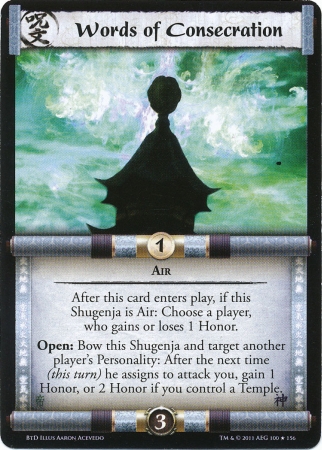
To prevent it from losing its potency, holy (or unholy) water must be kept in a properly consecrated container.
Ordination
must be performed on a cleric before the character can become the priest
of a congregation or assume similar sorts of duties,
and even an adventuring
cleric must be ordained before he or she can gain followers and
establish a following or other group.
In all cases, the cleric
performing the ordination must be of higher level than the recipient;
this ceremony is
often conducted as part of the training a cleric receives in order to advance
from second to third level.
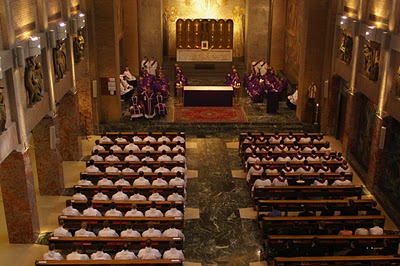
Special vows can be received by a would-be cavalier or paladin before that character embarks on career in the desired profession.
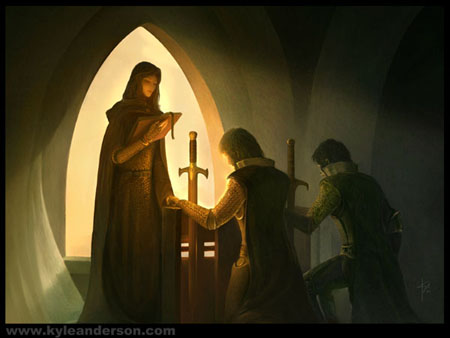
The effect of this spell
persist for as long as it takes the character to accumulate enough XP to
rise to the upper limit of his or her current level.
<grammar, above>
The special vows
can then be renewed as part of the character's training between levels,
or at any time during advancement
through the next higher level.
A cavalier or paladin who
has received special vows is immune to the effects of [bestow curse]
spells (but not cursed items)
for as long as the special
vows remain in effect.
Additionally, this ceremony
renders the subject more susceptible (-4 on saving throw) to any quest
spell cast upon him or her by a cleric of the same alignment as the caster
of the special vows.
Consecrate ground should be performed upon an area before any holy (unholy) structure is built on the site.
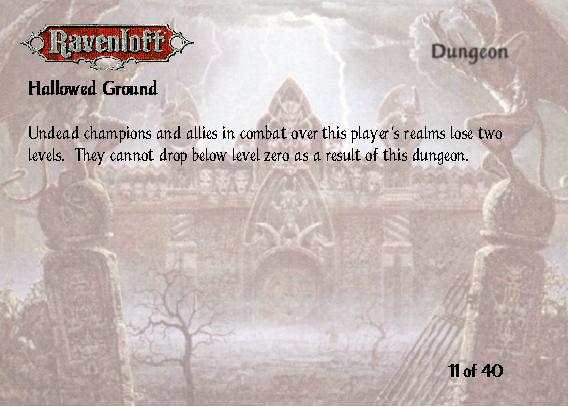
A religious edifice that
has been constructed on ground that has not been consecrated will
slowly but irrevocably fall into a state of disrepair and has a 1% chance
per year,
cumulative,
of actually collapsing as
a result of this oversight.
This spell must be cast
before the area in question is altered in any way (eg., landscaping)
and before any construction
materials are brought to the site;
it will have no effect if
it is done as an afterthought.
Consecrate ground
can also be used on a plot land destined for use as a graveyard,
and in such a case the graveyard
itself automatically turns undead each round with the same effectiveness
as a 3rd-level cleric.
Or, if the consecration
of a would-be graveyard is performed by an evil cleric,
any undead creatures occupying
the area are treated as if they were being protected and controlled by
an evil cleric of 3rd level.
<make links to appro
DMG sections?>
Anathematize
is a form of excommunication by means of which the offender is literally
branded on the cheek, forehead, arm, or hand
with a symbol, sigil, or
sign that identifies the subject (to those who understand the symbol)
as someone who has committed
a serious offense in the eyes of his or her deity.
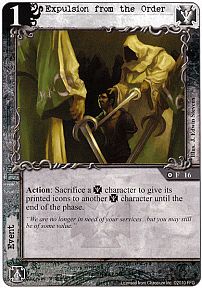
An unwilling subject of this
spell is allowed a saving throw versus spell, at -4, to escape its effects.
If the recipient is not
truly deserving of the telling brand,
the spell fails when cast.
A successful atonement
causes the brand to fade,
and possibly vanish.
If the offending actions
were caused magically or by some other external force,
the brand utterly disappears.
If the offending actions
were natural,
the brand cannot be completely
removed.
Standard costs for the casting of these spells are as follows:
MC: The components
for the various ceremony spells vary from religion to religion,
but the material component
always involves the use of the cleric's holy
symbol in one way or another.
- by Lenard Lakofka, from Beefing Up The Cleric (Dragon #58)
|
|
|
|
|
|
|
|
|
|
|
|
|
|
|
|
|
|
* One
creature, one item, or one area (see below)
The druidic ceremony
spell is similar to the
clerical spell of the same
name. It has a number of applications within
the hierarchy of druids.
The effect of a ceremony spell does not leave
behind an aura of magic,
although a know alignment spell or similar
magic might reveal the force
of true neutrality involved in the magic.
Druidic ceremonies include
the following, which can be cast by a
druid of the indicated or
lower
(higher) level:
1st-level
druid: coming of age, rest
eternal, marriage
3rd-level
druid: dedication, investiture
7th-level
druid: initiation, special
vows
9th-level
druid: hallowed ground
12th-level
druid: cast out
The characteristics of the
various types of druidic ceremony spells are
as follows:
Coming
of age is performed upon young people in druidic societies,
usually when they reach
the age of 14, and is symbolic of the young
manís |or| young womanís
entrance into adulthood. Effects of the spell
are the same as for the
clerical version ( + 1 bonus to a single saving
throw); see the cleric
text for other details.
Rest
eternal is cast upon the body of a deceased being, by means of
which the soul/spirit of
the creature is hastened in its journey to its final
resting place. The spells
raise
dead and resurrection will not restore
life to a character who
has been the object of this spell, although
a wish spell would serve
that purpose.
Marriage is essentially identical to the clerical ceremony of the same name.
Dedication
allows the recipient of the spell to be taken into the ranks
of the druidís
followers/worshipers, provided that the character is true
neutral in alignment. A
recipient of this spell is charged, as are druids,
with the responsibility
to preserve and protect nature and the balance
of forces in the world.
In other respects it is similar to the clerical ceremony
of the same name.
Investiture
is a rite that must be performed upon a character before he
or she can become an Aspirant
(1st-level druid). It conveys no other
benefit.
Initiation
imbues the druid with the shape-changing and immunity to
woodland charm powers that
become available to the character upon
<becoming an Initiate
of the 7th Circle>. This ceremony must be performed upon a druid
immediately after he or
she begins to advance upward through the
7th level of experience;
if cast earlier than this, it will not work, and the
druid will not have the
benefit of the above-mentioned special powers
until receiving initiation.
Usually a druid must seek out another
druid of 7th or higher level
to perform the rite, but in unusual cases a
druid may cast it upon himself
or herself.
Special
vows is a ceremony that operates in the same fashion as the
clerical
rite of the same name. It does not work upon paladins, but will
function upon cavaliers
of any alignment.
Hallowed
ground is cast by the druid on his or her permanent grove.
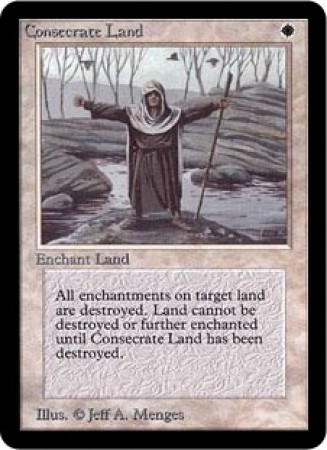
This ceremony ensorcels the
trees of the grove so that they will never
be affected by disease or
other natural disasters. The ground remains
hallowed for as long as
the druid maintains this grove as his or
her
permanent base.
Cast
out is a form of excommunication or punishment that can be performed
by a druid upon someone
who has committed sacrilege upon
the natural environment
or in some other way violated the principles
and standards of druidism.
Its effects may be lessened at a later date
by the casting of a reversed
version of this ceremony, either by the
same druid or another one
of at least as high a level as the original
caster, but the casting
out can never be completely neutralized except
by a Hierophant Druid of
any level. A character who has been
cast out exudes a powerful
negative aura, causing any natural creature
encountered to react negatively
to the character. This includes all
normal (non-magical) animals,
monsters native to the woodlands, domesticated
beasts such as horses
and dogs, and all druids and their
followers.
Casting out is a very powerful
form of punishment, and can only be
performed by a druid who
has received permission from his or her
Archdruid to do so. Similarly,
an Archdruid must get permission from
the Great Druid, and the
Great Druid from the Grand Druid. The
Grand Druid does not need
to obtain permission, but his or her
actions may be reversed
by a Hierophant Druid at any time.
This ceremony is usually
only used on occasions where the severity
of an offense warrants such
extreme punishment; a druid who asks
for and is denied permission
to perform it, or one who later has his or
her actions offset by another
druid, may be subject to punishment by
higher-ranking members of
the hierarchy. An intended recipient of
this ceremony who is unwilling
receives a saving throw versus spell,
at -4, to negate its effects.
MC: The components
of a ceremony spell always include mistletoe, and
the rite (of any sort) must
be performed in a druid grove or some other
natural, healthy patch of
forest. Such ceremonies are normally conducted
at either dawn or dusk,
the times when night and day are in
balance.
Q:
Should the first-level druidic spell
ceremony read in part, "druidic
ceremonies include the following,
which can be cast by a druid
of the
indicated or lower level,"
as it actually
does on page 41, or should
it
read as the description
for the clerical
ceremony? It doesn't make
sense
to restrict casting to levels
lower
than that specified.
A: The druidic ceremony
description is
incorrect. The specific
ceremonies noted
can be cast by druids of
the indicated level
or higher, as with
the clerical spell of the
same name.
(117.32)